|
|
|
Sort Order |
|
|
|
Items / Page
|
|
|
|
|
|
|
| Srl | Item |
| 1 |
ID:
148233
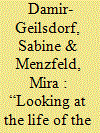

|
|
|
|
|
| Summary/Abstract |
This article explores self-ascriptions, processes of inclusion and exclusion, and senses of belonging in the everyday lives of German Muslims who orientate themselves towards the Salafiyya. Based on ethnographic fieldwork and in-depth interviews taking place over a year and a half, we draw on two case studies to show how demarcation lines between ‘us’ and ‘others’ can be established within the diverse Salafi communities and Salafi self-positioning in non-Muslim surroundings. The article sheds light on what orientation towards the life of the Prophet and the salaf sālih (the pious ancestors) means for the informants, especially focusing on their negotiations of being Salafiyya-oriented Muslims and citizens of Germany. Looking at their reasoning behind their own standing towards other persons labelling them Salafis, towards non-Salafis and towards possible opponents of Salafism, we provide insight into negotiations of political action, citizenship, identity and belongingness from an emic approach.
|
|
|
|
|
|
|
|
|
|
|
|
|
|
|
|
| 2 |
ID:
148230


|
|
|
| 3 |
ID:
148234
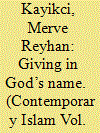

|
|
|
|
|
| Summary/Abstract |
In this article, I look into a case study of a kermes (kermis) to see how Islamic discourses can structure and re-structure an apparently mundane practice. The aim is to see how a mundane activity is transformed into an act of piety, simply because it is driven by a religious intention. Additionally, we study how this intention supported by the articulation of a particular interpretation of an Islamic tradition. Ultimately, the goal is to understand how the kermes is converted into a disciplined practice of moral construction, ethical conduct and allows for the fulfillment of religious and non-religious responsibility and, consequently, how a moral discourse can embed a completely mundane practice and transform it into an ethical cycle of self-development, sacred duty and gift giving. This study fills a gap in the literature on volunteering as it examines how practices of volunteering are developed according to a discourse of piety and are the result of a process of active decision-making, according to the context in which the volunteers live. The data for this research was gathered through participant observation and dialogue.
|
|
|
|
|
|
|
|
|
|
|
|
|
|
|
|
| 4 |
ID:
148229


|
|
|
|
|
| Summary/Abstract |
This paper discusses the changing socio-cultural landscape at Cheikh Anta Diop University of Dakar (UCAD), Senegal. It shows how the growing influence of the religious phenomenon since the late 1970s has encouraged young students to develop an Islamic activism that tends to replace the revolutionary and secular traditions that had dominated the space since the founding of this Senegalese university in 1957. These transformations, which take the form of a “decomplexification” of religion and of a communitarisation of the academic sphere, are also a reflection of the ongoing transformations in Senegalese society marked by a citizenship in transition. This transition translates itself into a duality between a “national citizenship,” with a francophone and secular character, and a “cultural citizenship,” inspired by Islam and initially driven by an Arab-Islamic elite as it negotiates its place in the public and administrative spheres that have historically been dominated by francophone elites.
|
|
|
|
|
|
|
|
|
|
|
|
|
|
|
|
| 5 |
ID:
148232


|
|
|
|
|
| Summary/Abstract |
This paper intends to describe new forms of national and transnational solidarity based on individual commitments to Islamic ethics and morality. This process is studied through the practices of young Muslim entrepreneurships that have emerged in the mid-2000s in Europe, promoting and distributing “islamized” conventional products in the fields of leisure, fashions, communication, in line with the cultural globalization as well as creating professional networks. This new market reflects on European Muslim’s desire for social mobility, using Islamized economic opportunities as a response to their marginalization, but also to create new forms of political pressure and religious codes through consumption that are adequate to their western environment.
|
|
|
|
|
|
|
|
|
|
|
|
|
|
|
|
| 6 |
ID:
148227
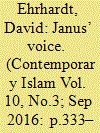

|
|
|
|
|
| Summary/Abstract |
This article analyses the role of religious leaders in collective violence in Kano, the major urban centre in northern Nigeria. It compares two episodes of collective action in the city—the violent ‘Plateau riots’ in 2004 and the non-violent ‘cartoon protests’ in 2006—to explore the role of religious leaders in the variation in violence between the two events. The core argument is that the ways in which Islamic and Christian preachers framed the triggering events for these cases facilitated different forms of mobilisation and enemy identification in response. In 2004, the interpretation of violence in Plateau State through the ‘Christians-versus-Muslims’ frame allowed for mobilisation within Kano’s Christian and Muslim communities as well as for the identification of local Christians as enemies. In 2006, in contrast, the infamous Danish cartoons were actively framed as part of the global struggle between faithful Nigerians and nonreligious Westerners, facilitating non-violent mobilisation across Christian-Muslim boundaries. Thus, the divergent discursive strategies employed by religious leaders are likely to have contributed to violent escalation in 2004 and to peaceful mobilisation in 2006. At the same time, however, the article emphasises the interaction of discursive framing with other factors, such as the role of security forces and the inextricable connections between religious and political authorities in Kano. The article is based on mixed-methods data collected in Kano between 2006 and 2012, including perceptions survey data, semi-structured interviews, and newspaper articles.
|
|
|
|
|
|
|
|
|
|
|
|
|
|
|
|
| 7 |
ID:
148231


|
|
|
|
|
| Summary/Abstract |
From the moment the first Turkish and Moroccan workers migrated to Europe in the early 1960s, the Turkish and Moroccan states have been concerned with how to bind emigrated citizens to their country of origin. In this article, we focus on Islam as a multi-dimensional binding mechanism. Religion is a broad register that links emotion, affect, and senses of belonging and binds individuals to political and cultural projects of collective actors and states. As we will demonstrate, it is a field in which both states and migrants have developed a variety of activities and initiatives, but it is difficult to single out what pertains to the state and what not. We argue that although state involvement in these two cases differs markedly, there are some intriguing parallels when we concentrate on religion. In both cases, religious affiliation is a very complex source of binding and of fission. State-monitored transnational networks have been tools of binding, but the same networks have engendered processes of disengagement from the state.
|
|
|
|
|
|
|
|
|
|
|
|
|
|
|
|
| 8 |
ID:
148228


|
|
|
|
|
| Summary/Abstract |
Gender segregation in the public domain has become a cornerstone of the Saudi interpretation of Islam (Doumato 2009). It is a development that has led to the coming about of extensive separate public spaces that are only for women (Doumato 2009; Hamdan 2005; Le Renard 2008, 2014). In these women-only public spaces, women undertake activities that are by them and for them, therewith reinforcing the existence of these separate structures. This institutionalisation and practice of women-only public spaces, as well as its opposite phenomenon of ‘mixing’ between the two sexes (ikhtilāṭ) however is contested and led to a heated debate. This debate centres around the question of whether and if so, how women should participate in the public domain. Starting with an overview of the historical development of women-only public spaces and ikhtilāṭ in Saudi Arabia, I will show how these have evolved. Drawing on fieldwork among urban, educated Saudi women, I shed light on how attitudes and strategies of female respondents regarding women-only public spaces and ikhtilāṭ are related to their ideas about their presence in the public domain and notions of ‘the liberation of women’, ‘empowerment’, and ‘the rise of women’. I conclude by demonstrating how ideas about the participation of women in the public sphere are positioned as part of the construction of a local, ‘enchanted’ modernity (Deeb, 2006) that has a material and a spiritual dimension.
|
|
|
|
|
|
|
|
|
|
|
|
|
|
|
|
| 9 |
ID:
148235


|
|
|
|
|
| Summary/Abstract |
A unique dimension of employee efficiency is reported in this paper. Sexuality in the work place, as well as rendezvous and romance in this context, have already received some attention from researchers but the topic is underexplored, most probably due to differences between Western culture and Asian culture. The primary focus of the study was to investigate the role played by religion in determining an employee’s sexual behavior, and in asking them to act within certain limits? The socio-economic circumstances, norms, customs, and obsession with social status that lead to delayed marriages push people into a corner, leaving them with the possible option of religiously forbidden actions where sexual desire is concerned. After indulging in such actions, regret and remorse create sexual frustration in employees, and this sexual frustration compromises their efficiency in the workplace. Ordinal regression and manipulations in syntax of ordinal regression were used to measure this concept. The study revealed that religiously forbidden actions and sexual frustration significantly diminishes the efficiency of some employees, whereas married and female employees are less sexually frustrated and thus are more efficient in the workplace.
|
|
|
|
|
|
|
|
|
|
|
|
|
|
|
|
| 10 |
ID:
148226
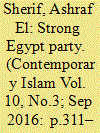

|
|
|
|
|
| Summary/Abstract |
Islamist parties espouse a socio-political platform that rests on the notion of creating an Islamic order and the application of the Islamic Sharia as a normative/legal and authoritative power structure. Progressive/Democratic Islamists is a term coined by some scholars to account for the emergence of new actors within the Islamic ranks starting from the 1990s in several Middle Eastern countries including Iran, Turkey, Egypt and North African countries. These actors depart from authoritarian political interpretations of Islamic texts, calling for a rationalist interpretation of Islamic idioms emphasizing the compatibility of Islam with democracy, pluralism, human rights and grassroots empowerment. This article analyzes the case of the Strong Egypt party (SEP) in the wake of the 2011 uprising in Egypt. It problematizes the identity of the party and its location in the ideological and political spectrum in Egypt. The article argues that the SEP claims a mixture of cultural conservatism, economic progressivism and political democracy, but that this mixture suffers from lack of depth, sophistication and a genuine social constituency and project.
|
|
|
|
|
|
|
|
|
|
|
|
|
|
|
|
| 11 |
ID:
148225
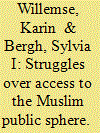

|
|
|
|
|
| Summary/Abstract |
This introductory essay provides the context for the articles in this Themed Section. Despite the diversity in locations, historical backgrounds and contemporary processes of change, all contributors to this Themed Section focus on the struggle of Muslim groups over access to an emergent Muslim public sphere. They highlight the contestations of and shifts in the notions of agency, belonging, and citizenship in nation-states with Muslim communities within its borders. The introduction consists of two parts. The first part reviews the notion of the public sphere as conceptualized by Habermas and critiqued by scholars of a diversity of backgrounds. In relation to the concept of the Muslim public sphere, three aspects of critique are given closer consideration in this first part: the value of thinking in terms of multiple publics, the loss of legitimacy of traditional religious authorities, and the importance of agency and identity that allow individuals to engage in a diversity of publics. The second part introduces the various contributions in the Themed Section.
|
|
|
|
|
|
|
|
|
|
|
|
|
|
|
|
|
|
|
|
|